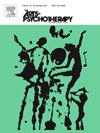Exploring a therapeutic songwriting program with three people experiencing homelessness and their communities through a cross case analysis
IF 1.5
3区 心理学
Q3 PSYCHOLOGY, CLINICAL
引用次数: 0
Abstract
The experience of homelessness is multidimensional, including joys and challenges. Service organizations predominantly “help” people experiencing homelessness, propagating hegemonic discourses and oppressive practices around homelessness. Music therapy literature regarding homelessness is scant, mostly exploring the role music therapy plays in meeting psychosocial goals. Minimal research exists that explores the role of music therapy in meeting people in strength, and challenging dominant perspectives around homelessness. Addressing this gap, I conducted a qualitative cross-case analysis to explore engagement in therapeutic songwriting with people experiencing homelessness and their communities. Three male adults experiencing homelessness engaged in a six-week individual therapeutic songwriting program, including writing, recording, and sharing an original song with audience participants. Songwriting participants completed two semi-structured interviews and audience participants completed reflections through email survey. Songwriting participants demonstrated agency during the songwriting program and assigned importance to developing the therapeutic relationship, expanding a relationship with music, and identifying future possibilities. Mutual giving and receiving were integral to the song sharing events, and audience participants responded with empathy and shifted their perspectives. A potentially harmful aspect of the therapeutic songwriting program was the development of unrealistic future expectations. Recommendations and clinical implications are discussed.
通过交叉案例分析,与三个无家可归的人和他们的社区一起探索一个治疗性的歌曲创作项目
无家可归的经历是多方面的,包括快乐和挑战。服务组织主要是“帮助”无家可归的人,围绕无家可归者宣传霸权话语和压迫行为。关于无家可归的音乐治疗文献很少,主要是探索音乐治疗在满足社会心理目标方面的作用。很少有研究探索音乐疗法在与有力量的人会面方面的作用,并挑战围绕无家可归的主流观点。为了解决这一差距,我进行了一次定性的跨案例分析,以探索与无家可归者及其社区的治疗性歌曲创作的关系。三名无家可归的成年男性参加了为期六周的个人治疗性歌曲创作项目,包括创作、录制和与听众分享一首原创歌曲。歌曲创作参与者完成两次半结构化访谈,听众参与者通过电子邮件调查完成反思。歌曲创作参与者在歌曲创作计划中表现出能动性,并重视发展治疗关系,扩大与音乐的关系,并确定未来的可能性。相互给予和接受是歌曲分享活动不可或缺的一部分,听众参与者对此表示同情,并改变了他们的观点。治疗性歌曲创作项目的一个潜在有害方面是对未来不切实际的期望的发展。讨论了建议和临床意义。
本文章由计算机程序翻译,如有差异,请以英文原文为准。
求助全文
约1分钟内获得全文
求助全文
来源期刊

Arts in Psychotherapy
Multiple-
CiteScore
3.20
自引率
11.10%
发文量
66
期刊介绍:
The Arts in Psychotherapy is a dynamic, contemporary journal publishing evidence-based research, expert opinion, theoretical positions, and case material on a wide range of topics intersecting the fields of mental health and creative arts therapies. It is an international peer-reviewed journal publishing 5 issues annually. Papers are welcomed from researchers and practitioners in the fields of art, dance/movement, drama, music, and poetry psychotherapy, as well as expressive and creative arts therapy, neuroscience, psychiatry, education, allied health, and psychology that aim to engage high level theoretical concepts with the rigor of professional practice. The journal welcomes contributions that present new and emergent knowledge about the role of the arts in healthcare, and engage a critical discourse relevant to an international readership that can inform the development of new services and the refinement of existing policies and practices. There is no restriction on research methods and review papers are welcome. From time to time the journal publishes special issues on topics warranting a distinctive focus relevant to the stated goals and scope of the publication.
 求助内容:
求助内容: 应助结果提醒方式:
应助结果提醒方式:


